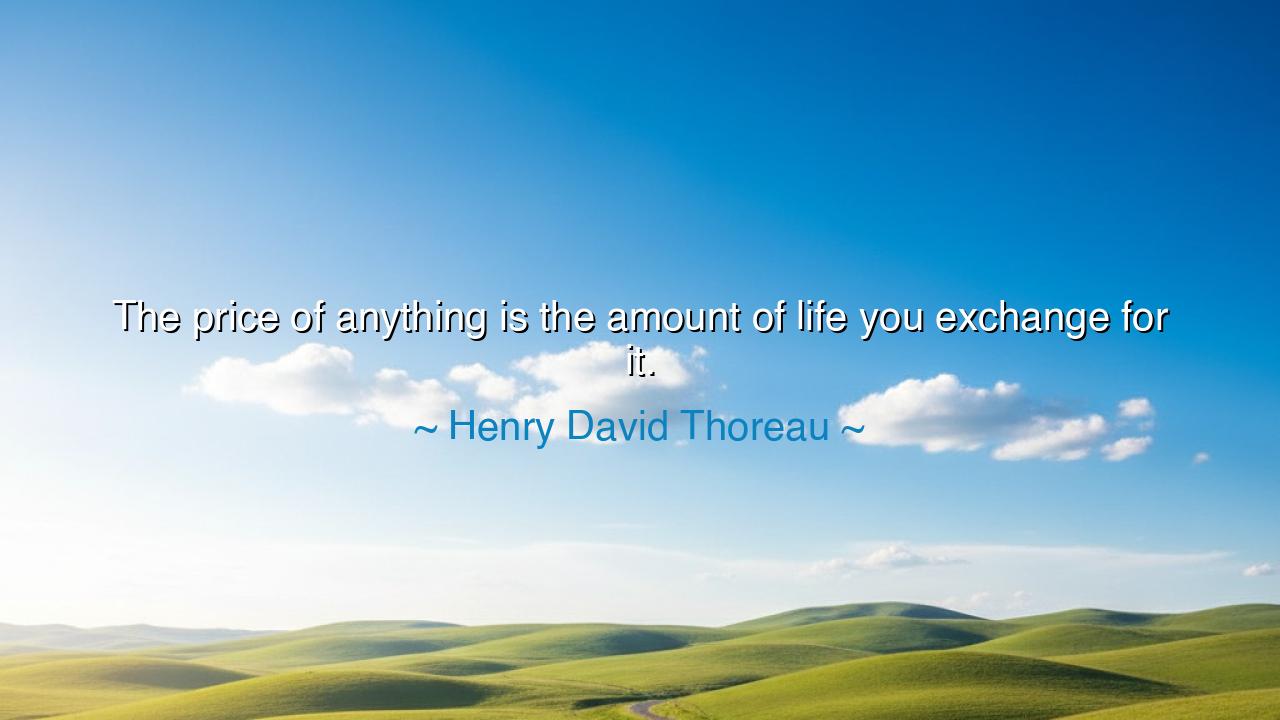
The price of anything is the amount of life you exchange for it.






In the sacred stillness of Walden Pond, where he sought to live deliberately and discover the essence of existence, Henry David Thoreau wrote words that still ring with the gravity of truth: “The price of anything is the amount of life you exchange for it.” These words, carved from solitude and reflection, pierce through the illusions of material value. Thoreau reminds us that the true measure of any possession or pursuit is not in money, nor in fame, but in the life-force we give to obtain it — the hours, the thoughts, the heartbeats that can never be reclaimed. Every desire we chase, every burden we bear, demands a portion of our limited and precious life. To spend it blindly is to trade eternity for dust.
The origin of this quote lies in Thoreau’s transcendental philosophy, born from his retreat to the woods near Concord, Massachusetts, in the mid-nineteenth century. There, in his small cabin by the pond, he sought simplicity — not as an escape, but as a return to truth. He had grown weary of the world’s endless commerce, where men, enslaved by possessions, “labor for superfluous things” and forget to live. Through his experiment in solitude, Thoreau realized that the greatest poverty is not the lack of wealth, but the wasting of life on what does not nourish the soul. Thus, when he declared that the price of anything is the life one exchanges for it, he was urging all people to awaken — to count their days as sacred coin, and to spend them only on what truly matters.
To understand the depth of his wisdom, consider the story of Leo Tolstoy, another soul who later walked the same path of awakening. At the height of his fame, Tolstoy had everything — wealth, estate, and renown — yet he was haunted by despair. He realized that the things he had pursued — comfort, status, admiration — had cost him the vitality of his spirit. They had not given him life; they had taken it. In his journals, he confessed that he had been “living a lie,” exchanging his soul for the illusions of success. Only when he turned to simplicity, humility, and service did he rediscover peace. His awakening, like Thoreau’s, revealed the same eternal truth: that life’s currency is not gold, but time, and that to misuse it is the greatest tragedy of all.
Thoreau’s teaching is not a condemnation of labor or effort, but a call to conscious living. He does not say, “Do not work,” but rather, “Know what you are working for.” The farmer who tills his soil to feed his family and nourish the earth spends his life well. The artist who devotes her hours to beauty adds meaning to the world. But the man who toils only to fill his house with things he never has time to enjoy pays with his soul for his possessions. The world teaches us to count the cost in money; Thoreau teaches us to count it in moments of being — in the breath, the peace, the presence of mind that each pursuit requires.
The ancients, too, understood this sacred arithmetic. The Stoic philosopher Seneca wrote, “It is not that we have a short time to live, but that we waste much of it.” He warned that men are frugal with money but reckless with time — though time, once lost, can never be restored. Thoreau’s words are the echo of that wisdom reborn in a modern age. He saw that civilization, in its hunger for progress, risks consuming the very thing it seeks to enrich — life itself. Every gadget, every convenience, every new ambition carries a hidden cost: the minutes and hours of existence we give up to acquire it.
Therefore, my children, take this lesson into your hearts: be mindful of what you trade your life for. Before you pursue a thing, ask: Is it worthy of my time? Does it bring peace, purpose, or joy? Remember that every purchase, every task, every dream demands payment in hours of your being. Guard those hours as a treasure. Spend them wisely — on love, on learning, on acts of kindness, on the pursuit of truth. For these are investments that yield not emptiness, but eternity.
And when you find yourself burdened by the race of the world, pause and remember Thoreau by his pond, listening to the wind and the call of the loon. He had little in possessions, yet his spirit was rich beyond measure, for he had learned the art of living — to give his life only to what nourished his soul. That is the secret of freedom. For in the end, the true wealth of a person is not what they have gained, but how they have spent their life — and whether, when the final hour comes, they can say with peace: I did not sell my days too cheaply; I lived them fully and with purpose.






AAdministratorAdministrator
Welcome, honored guests. Please leave a comment, we will respond soon